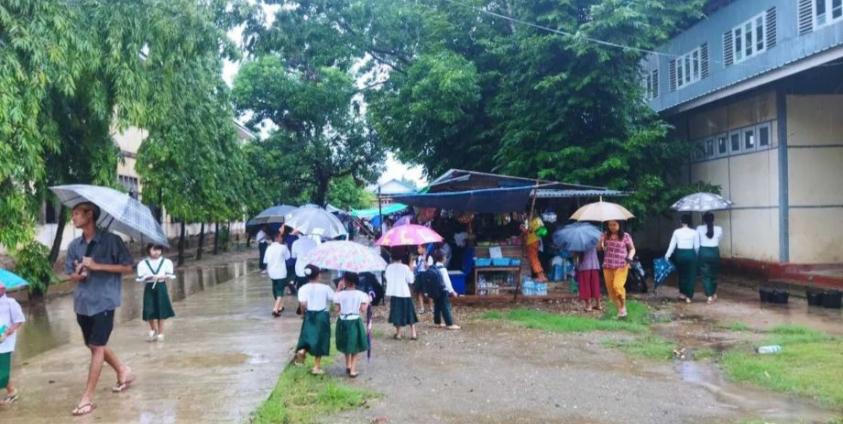Junta-controlled newspapers reports indicate that despite over 6,390,000 students enrolled in basic education schools nationwide this academic year, the figure marked a decrease from the previous year.
The figure represents the total number of students enrolled in basic education and monastic education schools within the territories under Junta control for 2024-25 school year.
However the enrollment figure for the preceding 2023-24 academic year stood at over 6 million 470,000 indicating a reduction of nearly 80,000 students within the span of a year.
On the other hand, approximately 60 towns and numerous rural regions throughout the country have fallen under the control of armed resistance forces and ethnic armed organizations, rendering it impossible for the regime’s education system to maintain operations in those areas.
As stated by U Pe Than, a seasoned politician, school enrollment in areas controlled by the resistance has seen a further decline, attributed to the resignation of teaching staff under the Junta, and the apprehension of being exposed to potential military conflict.
"Teaching the Junta's curriculum in areas controlled by the resistance has become very challenging. Some teachers have quit, while others have transferred out, mainly due to concerns about being caught up in potential conflicts. This fear is prevalent among both teachers and students, leading to hesitation in enrolling in school until they feel confident in the security situation. As a consequence, the student enrollment numbers have been steadily declining”, he suggested.
In the early aftermath of the coup, pro-democracy activists widely boycotted the Junta-controlled education system. However as the years went by and economic hardships, worsened by inflation became increasingly burdensome, many families found themselves with no other option but to resort to the Junta's basic education system.
In central plain regions where resistance against the Junta is potent, the Ministry of Education under the National Unity Government (NUG) has successfully established self-reliant basic education schools in both towns and rural areas.
A volunteer working in the self-reliant education sector in the Sagaing Region informed Than Lwin Times that no nearby Junta-controlled school would dare to operate.
In Sagaing Region, Shwe Pyi Aye, Myo Thit, Maw Luu, and Khampat towns are under the control of the NUG and People's Defense Force (PDF).
A teacher involved in the Civil Disobedience Movement (CDM) informed Than Lwin Times that preparations for the establishment of self-reliant schools have been expedited in Chin State as well, where the Junta has lost control over 13 towns to resistance forces.
"We are focusing on setting up self-reliant schools in the villages and reaching out for volunteer teachers to join us. We have gathered textbooks and teaching materials, but when we attempt to order them, we are seeing prices double due to transportation hurdles. There is still a lot left to do”, she said.
Simultaneously efforts are underway to seek donors to support volunteer teachers and acquire teaching materials, she added.
However, the CDM community highlighted that due to the relentless threat of the Junta's brutal and indiscriminate airstrikes, children in those areas still cannot pursue their education in a peaceful environment.
According to data published by the Institute for Strategy and Policy - Myanmar (ISP-Myanmar) in the middle of last year, the expected enrollment for each school year in Myanmar is around 12 million students. This indicates that between 8 -10 million children have been deprived of their right to education in the three years since the coup.







